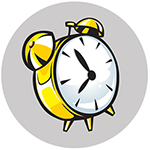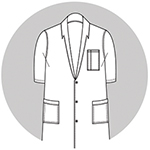So you want to be a graduate student?
Each year, we have the opportunity to meet the incoming class of graduate students and witness their optimism and ambition. By the time we cross paths again, many of them are looking for jobs outside academia or considering dropping out to work on Wall Street. The long hours, interminable troubleshooting and low pay of our industry contribute to the general disillusionment, but a kind of naive obliviousness is equally to blame: Many people simply do not come prepared.
So, to those serious students who crave to know what it is they are entering into, who are mentally and spiritually ready, willing and able — those who have a visceral need to know and understand — we say this: Welcome to our world! We offer the below advice, gathered over a perilous half-decade spent pursuing Ph.D.s in the biomedical field, to prepare you for the journey to come.
Be dedicated
Don’t be a fence sitter or a flip-flopper. If you are going to be a scientist, be sure about it. Be single-minded in your determination to achieve the goal you have set. If the idea of standing in the cold room all day purifying a protein makes you want to curl up in a blanket and cry, or if squinting at a confusing Western blot wondering if the band is real or the result of spilled coffee leads you to doubt the wisdom of your decision, you will be a liability not only to yourself but to others. Biomedical research is a certain path to uncertain data, and you must be OK with the ambiguity as part of your daily routine.
Be prompt

Keep reasonable hours in the lab and arrive at classes and meetings on time. Despite the inherent flexibility of your work schedule, do not let yourself slide into an overly relaxed routine just because no one is punching you in and out of the office. Scientists generally roll into work at a pleasant 10 a.m., so go ahead and sleep in a little, but remember that you will probably get a lot more done if you show up in the morning, not the afternoon. Similarly, arriving late to meetings reflects poorly not only on you but also on those you represent. In the best case, your lateness simply will be noted. In the worst, you will have missed your own presentation, and the seminar will go on without you. Also, do not make it a habit to call in sick. Unless you are bleeding from the eyes, have lost a limb or there was a death of an immediate family member, you can tough it out and make it into lab.
Never make excuses or blame others
This is most tempting when your experiments are not working and you discover cathartic release in scapegoating a colleague or junior student. It is easy to blame the technician for making a faulty buffer, the lab manager for ordering the wrong item or the rotation student for contaminating the samples, but as a graduate student, you must recognize that you are the one who planned, executed and screwed up the experiment. Figure out what went wrong, own up to it and don’t do it again. Ever. You are going to make mistakes; at least keep things interesting by making different ones.
Be prepared to witness every form of human folly and injustice
Science is no different from other industries when it comes to potentially strained employer-employee relations, unfair credit and compensation, and workplace strife. What may be different is your unrealistic expectation that biomedical research is invariably just while banking is fundamentally vile. The truth is that you will have to endure or confront the contradictions, double standards and inequities of this and any other work environment. Do not let petty squabbles drive you to tears or depression, but do chime in, for example, if your contribution to the manuscript is being overlooked.

Stay motivated even when there is little hope for immediate gratification
The first year of graduate school consists of classes and rotations, both of which have strict deadlines similar to those of a curriculum at an undergraduate institution. However, the next five to six years are an amorphous amalgam of not-really-required requirements.
For example, you can apply for a fellowship, but you do not really have to. You can present at the Gordon conference, but chances are no one will notice if you don’t. Additionally, with the exception of grants, there are few strict deadlines. You can choose to write your manuscript this month or next month. You can schedule your committee meeting anytime between April and September. You can pick up that new project today or forget about it entirely.
The freedom can be liberating and inspirational, but it also can cause a kind of dejected impotence, crippling your ability to be timely and productive.
Do not covet thy neighbor’s project or Nature paper
Your neighbor’s project may be flourishing while yours is floundering in a sea of 5 percent blocking milk, but remember that what matters most in these five to six years are your personal accomplishments (not how many papers your lab mate has published). After classes are over, you are not in direct competition with any of your colleagues. Focus on your science — not theirs.
For technicians only

For the laboratory technicians who are in the trenches and considering going to graduate school, I have some advice too. As an ex-technician myself, I may be able to offer relevant insights.
So you really, really want to be a scientist? You want to go to graduate school and earn those three little letters (Ph.D.) after your name?
First, let’s back up: You have become familiar with this business, accustomed to working eight- or nine-hour days, with weekends, evenings and holidays off. You went home for your father’s 60th birthday, picked up guitar lessons two nights a week and still managed to get your name on a paper or two. You enjoyed a structured work schedule and were treated with a modicum of dignity by your colleagues and employers.
You think graduate school will be a prolonged extension of this condition? Then perhaps you should reconsider.
The first year of graduate school is a confounding and arduous combination of difficult courses and disorienting rotations, juggled until you drop the ball, become a master multitasker or sign up for psychotherapy sessions because they are free with the school’s insurance.
You will have little to no time for hobbies, trips or a significant other, and good luck explaining to your grandmother the concept of not having vacation time when she calls biweekly for four years straight to ask if you are coming to visit for the holidays.
You may be more overwhelmed within the first month of graduate school than at any other point in your life. However, don’t let that stop you.
Graduate school will give you the opportunity to own your projects, first author your papers and control the direction of your experiments. It will be a chance to birth and raise your own thought babies, not just babysit someone else’s.
It may be one of the most rewarding experiences of your career, and it will allow you to put the manual skills you already have to the critical-thinking skills you crave to nourish.
Do not lie
Small lies have a way of building on one another until the line between omission and fabrication is blurred entirely, as evidenced by the many horror stories of prominent scientists’ falls from grace. Reputation is everything. Keep yours unscathed.
Choose an adviser who is a good mentor
Your adviser and, to a lesser extent, committee are going to be your guides through graduate school. Besides making the choice to attend graduate school, choosing the right adviser is the most important decision of your academic career. No pressure!

Read, read, read!
This is one of most important habits of a blooming scientist. Keep a constant and vigilant eye on the literature for your area of interest, development of new techniques and, most importantly, your competition. This will help prevent you from spending several years working on a project only to realize that your competition already published the same data. While you may find that there is an overwhelming amount of literature on any given subject, learning how to sort through a sea of esoteric information is part of your graduate training, so jump right in.
Have a sense of humor about things
You are going to need it.

On the bright side
The above list, by attempting to prepare incoming students for the more challenging aspects of graduate school, attests to the difficulty, laboriousness and confusion of pursuing a biomedical Ph.D. without giving equal voice to the advantages of spending six years in an intellectual alcove teeming with brilliance and inspiration. In the spirit of fairness and balance, here we offer a few words on why attending graduate school is, contrary to popular belief, one of the most worthwhile endeavors you will undertake.
First, you will make friends — the kind who witness the roller coaster of your graduate-school career and empathize every step of the way; the kind who drink with you at happy hour to mourn the day your paper is rejected by one top journal and to celebrate the day it is accepted by another; the kind who critically read your fellowships and manuscripts for nothing more than a brief acknowledgment at the bottom and a hope that you will do the same; and the kind who come into work on a Saturday morning to read your plate because you are feeling particularly hungover and incompetent that day.
You will learn to ask great questions, make astute suggestions, troubleshoot complex problems, respond prudently under rapid fire and store beer in the cold room in a way that makes it impossible for anyone but you to find it.
You will become an expert in your field and give back to the scientific community. You will inform your colleagues about the new trick you discovered for setting up a more reliable assay, you will teach the rotation student how to run a Western blot and you will mold the college junior into an up-and-coming scientist. You will enlighten your committee members and your boss, people who invested a great deal of time in your education so that you could return the favor.
So go to graduate school, because while there will be no grades, dean’s lists or guidance counselors to gratify your ego-driven need for commendation, there will be a self-propagated collection of opportunities and achievements that are more intimately yours than any A+ we can deign to award you.
Enjoy reading ASBMB Today?
Become a member to receive the print edition four times a year and the digital edition monthly.
Learn moreFeatured jobs
from the ASBMB career center
Get the latest from ASBMB Today
Enter your email address, and we’ll send you a weekly email with recent articles, interviews and more.
Latest in Careers
Careers highlights or most popular articles

From humble beginnings to unlocking lysosomal secrets
Monther Abu–Remaileh will receive the ASBMB’s 2026 Walter A. Shaw Young Investigator Award in Lipid Research at the ASBMB Annual Meeting, March 7-10 in Washington, D.C.

Chemistry meets biology to thwart parasites
Margaret Phillips will receive the Alice and C. C. Wang Award in Molecular Parasitology at the ASBMB Annual Meeting, March 7-10 in Washington, D.C.

Decoding how bacteria flip host’s molecular switches
Kim Orth will receive the Earl and Thressa Stadtman Distinguished Scientists Award at the ASBMB Annual Meeting, March 7–10, just outside of Washington, D.C.

Defining JNKs: Targets for drug discovery
Roger Davis will receive the Bert and Natalie Vallee Award in Biomedical Science at the ASBMB Annual Meeting, March 7–10, just outside of Washington, D.C.

Upcoming opportunities
No matter where you are in your career and what future path you aspire to, everyone needs leadership skills. Join ASBMB for practical strategies for building and practicing leadership skills.

Close out ASBMB 2026 with a bang
The closing reception of the 2026 ASBMB Annual Meeting will be held at the Torpedo Factory Art Center in Alexandra, Virginia.


